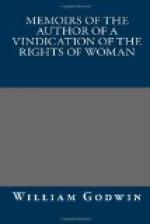What I wanted in this respect, Mary possessed, in a degree superior to any other person I ever knew. The strength of her mind lay in intuition. She was often right, by this means only, in matters of mere speculation. Her religion, her philosophy, (in both of which the errors were comparatively few, and the strain dignified and generous) were, as I have already said, the pure result of feeling and taste. She adopted one opinion, and rejected another, spontaneously, by a sort of tact, and the force of a cultivated imagination; and yet, though perhaps, in the strict sense of the term, she reasoned little, it is surprising what a degree of soundness is to be found in her determinations. But, if this quality was of use to her in topics that seem the proper province of reasoning, it was much more so in matters directly appealing to the intellectual taste. In a robust and unwavering judgment of this sort, there is a kind of witchcraft; when it decides justly, it produces a responsive vibration in every ingenuous mind. In this sense, my oscillation and scepticism were fixed by her boldness. When a true opinion emanated in this way from another mind, the conviction produced in my own assumed a similar character, instantaneous and firm. This species of intellect probably differs from the other, chiefly in the relation of earlier and later. What the one perceives instantaneously (circumstances having produced in it, either a premature attention to objects of this sort, or a greater boldness of decision) the other receives only by degrees. What it wants, seems to be nothing more than a minute attention to first impressions, and a just appreciation of them; habits that are never so effectually generated, as by the daily recurrence of a striking example.
This light was lent to me for a very short period, and is now extinguished for ever!
While I have described the improvement I was in the act of receiving, I believe I have put down the leading traits of her intellectual character.



